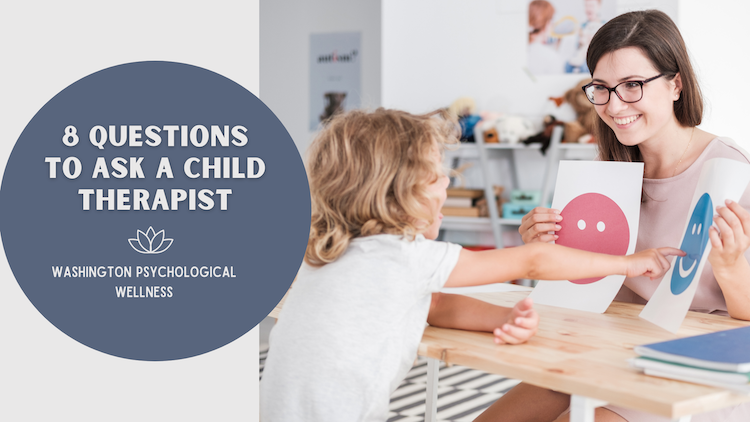
8 Questions to Ask a Child Therapist in Washington DC
As a parent, you want the best for your child. So when considering a therapist, you may feel uncertain whether or not the clinician you’ve found is a good fit. In addition to wanting your child’s therapist to be professional, likable, trustworthy, you want them to have expertise in the disorders they treat. 8 Questions to Ask a Child Therapist in Washington DC
Along with a few general questions to ask, here are 8 other considerations to reassure you that your child receives quality mental health care.
Are you licensed?
Generally speaking, therapists are required to be licensed by the state they practice in. Or, they need to have a direct supervisor they report to if they’re in the process of licensure.
Each state varies regarding what they require for licensure, but generally, it means that the therapist has passed several standards within that state. They usually have a master’s degree, many hours working with clients, and have passed a written exam.
What kind of training do you have?
Depending on who you decide to work with, the education and training of a therapist can vary. They may be a psychologist, counselor, or social worker. All of them provide therapy, but their education differs slightly.
Be sure to ask about your therapist’s training to ensure that they’ll best fit the needs of your child.
What’s your treatment orientation?
Orientation refers to the therapist’s approach, in which they utilize specific theories to understand and treat mental health conditions. Similar to education, the direction of a therapist varies.
Get familiar with the number of approaches a therapist can utilize to get an idea of which one best fits your child’s needs.
What’s your expertise or specialty?
Children’s mental health professionals offer various treatments, but it’s essential to know that not every approach will work for your child. Research promotes the use of some over others for certain behaviors or disorders.
Be sure to ask your therapist about which treatment is right for your child.
What will a session be like?
During their sessions, your child can express uncomfortable fears, emotions, thoughts, and experiences through talk, play, art, and sand tray therapy. These therapeutic interventions are developmentally appropriate and can help your child communicate in ways that feel safe, approachable, and easy to understand.
Every therapist will select an intervention based on your child’s unique needs, so you may find it beneficial to get an idea of what to expect beforehand.
Can you help me better understand child development?
It’s normal for parents to want to know what to look for, when to worry, and what to do next. There can be many questions around the typical child development for parents, and even more about specific diagnoses and treatment options.
All therapists should be willing to discuss with parents what’s considered a healthy developmental milestone, what’s a phase, or an indicator of an illness. Education around these issues is crucial to understanding the nature of a child’s challenges and options for successful treatment.
Can you give me referrals for other services as needed?
Clinicians try to utilize teachers, doctors, and other mental health professionals in the treatment plan.
If your child requires services from another professional, your therapist will be able to provide you with a trustworthy referral. In some cases, this may include a nutritionist, speech and language specialist, or a medical provider.
Regular communication that combines each member of the team into a comprehensive plan significantly Improves the success of treatment.
How much does each session cost?
Therapy can be expensive, so it’s essential to know how much each session will cost from the start. If you’re using insurance, you may want to learn what your co-pay would be.
Some therapists offer sliding scale fees for those who choose not to utilize insurance or have trouble affording the cost. A sliding scale is based on your income.
Additionally, it may be useful to ask about any additional fees for missed or canceled appointments.
Finding the right therapist
At Washington Psychological Wellness, our child counselors and therapists practice an integrative, holistic approach to healing, taking into account the mental, physical, and emotional health of your child and their physical, interpersonal, and familial well-being.
We consider each child unique and encourage parental involvement in every treatment step; to learn more, contact us today.
